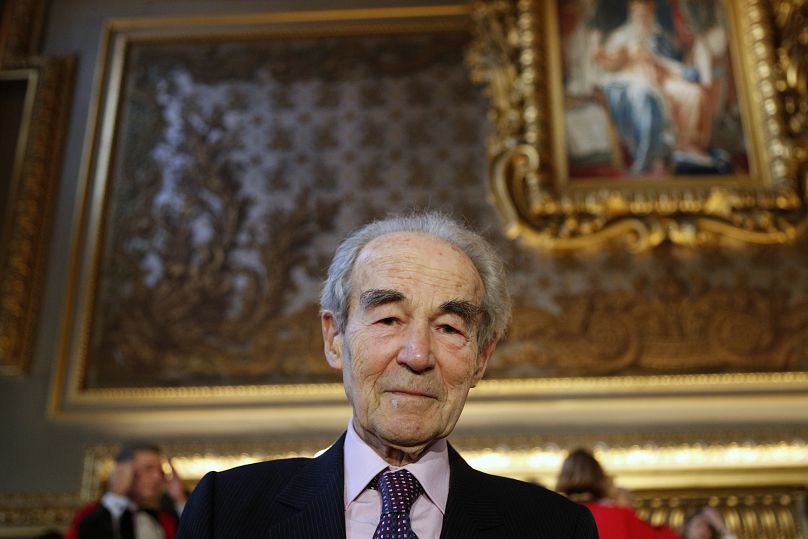Just eight trials have been filmed in France before this week's landmark Charlie Hebdo terrorism hearing. Here's why the event will be videotaped.
The trial of 13 men and a woman accused of providing the perpetrators of the Charlie Hebdo attacks with weapons and logistics marks the first-ever terror trial in France to be filmed. It is set to get underway on Wednesday (September 2)
 ADVERTISEMENT
ADVERTISEMENT
 ADVERTISEMENT
ADVERTISEMENT
In France, it is illegal to video legal hearings and the offence can carry a fine of €18,000.
Since a law was passed in 1985 authorising audio and visual recordings in cases of exceptional historic interest, there have been just eight exceptions, before the Charlie Hebdo case.
The January 2015 attacks on satirical magazine Charlie Hebdo, police officers and a kosher supermarket in Paris saw 17 people killed over three days.
First President of the Paris Court of Appeal, Jean-Michel Hayat, can grant permission to film court proceedings and he did so for this case in June after he received a special request from the National Anti-Terrorist Prosecutor's Office.
"The repercussions and the emotion they (the attacks) generated have exceeded our borders substantially (...) They have profoundly marked the history of national and international terrorism," he said when announcing his ruling.
On its website, the Ministry of Justice states that for an audiovisual recording to be permitted at a public hearing, the trial must be of interest for France's judicial history.
In making an exception to the law, the authority aims to "preserve the memory of atrocities committed and for researchers to have access to images allowing them to carry out scientific research".
Lawyer Robert Badinter, well-known in France for enacting the abolition of the death penalty in 1981 while serving as Minister of Justice under François Mitterrand, was a key figure in passing the law that meant trials could be filmed due to their historical significance.
The first audiovisual recording in a French courtroom took place in Lyon, in the Rhone department, between May 11 and July 3, 1987 -- that of Nazi criminal Klaus Barbie, nicknamed "the Butcher of Lyon".
Barbie stood trial for having led the Gestapo in the city, during which he had personally tortured Jean Moulin, had many resistance fighters and hostages executed, and sent hundreds of Jews to their deaths, including Badinter's father who died in Sobibor extermination camp.
The next two trials that were recorded on video by French judicial authorities were also directly linked to World War II.
The first was the 1994 trial of Paul Touvier, former head of the Lyon militia working hand in hand with the Nazis, and late 1997 to early 1998 trial of Maurice Papon, a former Vichy regime official accused of being involved in the deportation of Jews.
The eight trials that have been filmed in France
Klaus Barbie before the Rhône Assize Court from May 11 to July 3, 1987;
Paul Touvier before the Yvelines Assize Court from March 17 to April 20, 1994;
Maurice Papon before the Assize Court of the Gironde from October 8, 1997 to April 2, 1998;
Robert Faurisson, a Holocaust denier, against Robert Badinter before the Paris Tribunal de Grande Instance from March 12 to April 2, 2007;
First hearing of the AZF fertiliser plant blast before the Toulouse Criminal Court from February 23 to June 30, 2009;
AZF first appeal before the Toulouse Court of Appeal from November 3, 2012 to February 2013;
AZF second appeal before the Paris Court of Appeal from January 24 to May 24, 2017;
- Victims of the Augusto Pinochet dictatorship before the Paris Assize Court from December 8 to 17, 2010;
- Pascal Simbikangwa, former soldier and member of the Rwandan intelligence services, before the Paris Assize Court from February 4 to March 14, 2014;
Pascal Simbikangwa on appeal before the Seine-Saint-Denis Assize Court from October 25 to December 3, 2016;
- Octavien Ngenzi and Tite Barahirwa, two former mayors of Kabarondo in eastern Rwanda where a massacre took place during the country's genocide, before the Paris Assize Court from May 10 to July 7, 2016;
Octavien Ngenzi and Tite Barahirwa on appeal to the Paris Assize Court from May 2 to July 6, 2018.
The events might at a glance seem unrelated, but they all involved the deaths of French nationals.
Once a final ruling of the trials has been handed out by the justice system, the recording must be handed over to the national archives.
The recordings cannot be broadcast or reproduced until 50 years later must, except where a case deals with "crimes against humanity", which was the case with Klaus Barbie's trial.











